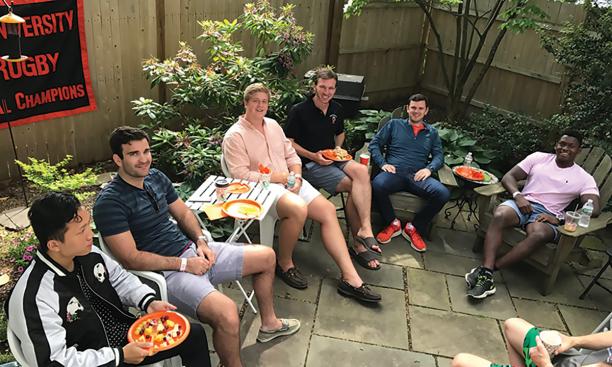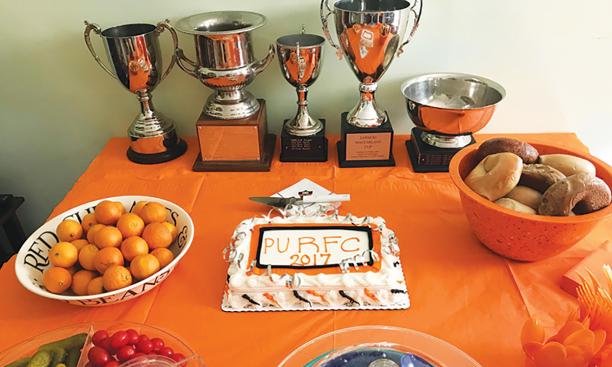
On the Sunday of Reunions weekend, the tight-knit Princeton rugby community will meet up to continue a beloved two-decade tradition that is breathtaking in its no-frills simplicity.
For some four hours, scores of people — current undergraduate rugby players and alumni of the program, along with their parents, grandparents, partners, and children — will wander through the cozy Princeton home of Richard Lopacki, who retired last year as coach of the rugby club team.
The visitors will snack on bagels, fruit, cake, and coffee; play with rugby balls and stuffed tigers; and admire the large collection of trophies, photos, and memorabilia amassed by Lopacki and his wife, Sandy — “a little bit like a Princeton rugby museum,” Richard Lopacki says. During relaxed conversations, teammates will renew old friendships or forge new ones with alumni from different generations. And crucially, no alcohol will be served: The occasion is known as Sober Sunday.

“There’s no party, there’s no exciting event, there’s no speaker, there’s no band — there’s none of that,” says Alex Rogers ’20, an aerospace engineer living in Washington, D.C., who played rugby throughout his college career and served as club president for a year. “Everyone is there for the same reason, which is they care very much about the program, and they care very much about the people who also care about the program.”
Globally, rugby has a reputation as a sport in which intense physical demands forge close team bonds — often lubricated with alcohol. Princeton’s Reunions, too, is sometimes portrayed as a booze-soaked bacchanalia — an unverifiable urban legend holds that the University’s beer order for the occasion is second only to that of the Indianapolis 500 — although Princeton spokeswoman Jennifer Morrill notes that this year’s Reunions program includes more than 225 events at which no alcohol will be served.
For Lopacki, Sober Sunday’s booze-free branding is a marker of what he wants the occasion to exemplify: An opportunity to slow down at the end of the packed Reunions weekend and to reconnect with a supportive community in a calm, unhurried way. “Real belonging is about friendships, and having people you can reach out to during good times but also during difficult times,” Lopacki says. “I think it is important, especially for men, to have quiet time with each other.”
Lopacki’s work at Princeton — he coached the men’s rugby team for 23 years and helped coach the women’s team for four of those years — was nominally a side hustle; his career, much of it spent at Johnson & Johnson, was in consumer marketing.
But rugby alumni describe the Lopackis, who have no children of their own, as nurturing, deeply involved elders who traveled with the team to out-of-town games, invited students over for dinners and Thanksgiving celebrations, and hosted middle-of-the-night gatherings to watch broadcasts of overseas rugby matches.
“Rich and Sandy are parent figures to an entire generation of Princeton rugby players,” says Liz Inkellis Langhammer ’07, an orthopedic surgeon in Baltimore who co-captained the women’s team her senior year at Princeton. “They’ve seen a lot of the players through all stages of life and really embraced that.”
Indeed, Lopacki estimates that he and his wife have been invited to nearly 50 rugby weddings and have welcomed some 125 rugby babies. “One of the biggest honors, to know that you’ve made it, is to see your photo on Richard’s fridge,” says Peter Na ’14, a former men’s rugby co-captain who now works in finance in New York City. “That was always a goal that we all aspired to.”
Despite his retirement, Lopacki continues to coach the alumni rugby team, the Flying Tigers, which plays a few times a year, including during an annual weekend trip to a sunny international destination. “A lot of it is making people feel that they belong to something special, keeping them connected,” Lopacki says.
The Sober Sunday brunch is “an homage to the program,” Rogers says. “Sober Sunday is just a representation of the larger thing — the intangible thing that you are a part of, that still means so much.”
Deborah Yaffe is a freelance writer based in Princeton Junction, New Jersey.
